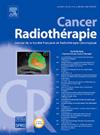食管癌的新辅助放化疗:原发肿瘤/淋巴结消退不一致及预后价值分析
IF 1.4
4区 医学
Q4 ONCOLOGY
引用次数: 0
摘要
目的肿瘤消退分级是评价新辅助放化疗患者预后的重要指标。然而,当原发肿瘤和淋巴结的肿瘤消退级别不一致时,关于预后的影响存在重大争议。本研究旨在阐明肿瘤消退等级不一致对食管癌预后的影响,并找出造成这种不一致的潜在原因。材料与方法112例食管鳞状细胞癌患者行新辅助放化疗后手术治疗。采用Cox单因素分析来评估原发肿瘤消退分级、淋巴结消退分级、无复发生存期和总生存期之间的关系。采用Logistic单变量分析来确定导致原发肿瘤和淋巴结退化等级不一致的因素。结果食管癌患者术前治疗后原发肿瘤及淋巴结消退分级、淋巴结病理分型是影响患者无复发及总生存期的重要因素。在38.4%的病例中,原发肿瘤和淋巴结消退等级不一致。放疗方式(累及野区或选择性淋巴结照射)和淋巴结清扫数等因素对原发肿瘤和淋巴结消退分级的一致性有显著影响。当肿瘤消退级别不一致发生时,淋巴结状态比原发肿瘤有更显著的预后影响。结论原发肿瘤和淋巴结消退分级是影响无复发生存的关键因素。淋巴结清扫的数量和放疗方式可能导致这两个指标之间的不一致。当不一致发生时,淋巴结消退分级可能比原发肿瘤分级具有更大的预后价值。本文章由计算机程序翻译,如有差异,请以英文原文为准。
Neoadjuvant chemoradiotherapy for oesophageal cancer: Primary tumour/lymph node regression inconsistency and prognostic value analysis
Purpose
Tumour regression grade is an important prognostic indicator for patients undergoing neoadjuvant chemoradiotherapy. However, there is significant controversy regarding the prognostic implications when there is discordance between tumour regression grade in the primary tumour and lymph nodes. This study aims to clarify the impact of tumour regression grade discordance on prognosis for oesophageal cancer and identify potential causes for such discrepancies.
Material and method
A total of 112 patients with oesophageal squamous cell carcinoma who received neoadjuvant chemoradiotherapy followed by surgical treatment were included. Cox univariate analysis was performed to evaluate the relationship between primary tumour regression grade, lymph node regression grade, and both recurrence-free survival and overall survival. Logistic univariate analysis was employed to identify factors contributing to primary tumour and lymph node regression grade discordance.
Results
Primary tumour and lymph node regression grades, and nodal pathologic classification after preoperative therapy were significant factors influencing both recurrence-free and overall survival of patients with oesophageal cancer. Discordance between primary tumour and lymph node regression grades was observed in 38.4 % of cases. Factors such as radiotherapy modality (involved field or elective nodal irradiation), and the number of lymph nodes dissected were found to significantly affect the consistency between primary tumour and lymph node regression grades. When tumour regression grade discordance occurred, lymph node status had a more significant prognostic impact than the primary tumour.
Conclusion
Both primary tumour and lymph node regression grades are critical factors influencing recurrence-free survival. The number of lymph nodes dissected and the radiotherapy modality may contribute to discordance between the two indices. When discordance occurs, lymph node regression grade may hold more prognostic value than that of the primary tumour.
求助全文
通过发布文献求助,成功后即可免费获取论文全文。
去求助
来源期刊

Cancer Radiotherapie
医学-核医学
CiteScore
2.20
自引率
23.10%
发文量
129
审稿时长
63 days
期刊介绍:
Cancer/radiothérapie se veut d''abord et avant tout un organe francophone de publication des travaux de recherche en radiothérapie. La revue a pour objectif de diffuser les informations majeures sur les travaux de recherche en cancérologie et tout ce qui touche de près ou de loin au traitement du cancer par les radiations : technologie, radiophysique, radiobiologie et radiothérapie clinique.
 求助内容:
求助内容: 应助结果提醒方式:
应助结果提醒方式:


